Climate change
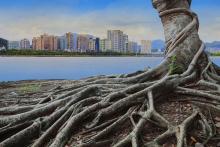
WHEN WE CONSIDER the crisis of climate change, many of us swing back and forth between a narrative of despair in which “there is nothing we can do” and a narrative of hope that affirms that good futures are available when we act responsibly. Surely Laudato Si’, the encyclical released by Pope Francis last spring, has given enormous impetus to the narrative of possibility, summoning us to act intentionally and systemically about climate change.
The issue of climate change is a recent one, but the matter of revivifying the creation is a very old one in faith. In ancient Israel, as now, care for creation required a vision of an alternative economy grounded in fidelity.
The economy of ancient Israel, a small economy, was controlled and administered by the socio-political elites in the capital cities of Samaria in the north and Jerusalem in the south. Those elites clustered around the king and included the priests, the scribes, the tax collectors, and no doubt other powerful people. Those urban elites extracted wealth from the small, at-risk peasant-farmers who at best lived a precarious subsistence life. The process of extraction included taxation and high interest rates on loans. These were financial arrangements that drove many of the peasants into hopeless debt so that they were rendered helpless in the economy.
While that arrangement was exploitative, it no doubt appeared, at least from an urban perspective, to be normal, because the surplus wealth and the high standard of living it made possible seemed natural and guaranteed. The power people who operated the economy could assume surplus wealth, and the exploited peasants were impotent in the face of that power. The arrangement appeared to be safe to perpetuity.
Speeches of judgment
Except that a strange thing happened in ancient Israel in the eighth century B.C.E. (750-700 B.C.E.). There appeared in Israel, inexplicably, a series of unconnected, uncredentialed poets who by their imaginative utterance disrupted that seemingly secure economic arrangement. We characteristically list in that period of Israelite history four prophets—Amos, Hosea, Isaiah, and Micah. They came from various backgrounds, but they shared a common passion and a stylized mode of evocative speech.
The “normative” economy of the period had assumed that the economy consisted of only two participants: 1) the productive peasants, and 2) the urban elites, who did not work or produce anything but who lived well off of peasant produce. Those uncredentialed poets, however, dared to imagine and to utter that there was, inescapably, a third participant in the political economy: namely, the emancipatory God of the Exodus.
“We can’t just blame it on the brokenness of the world, pray for peace, and move on, worried that anything more will be seen as politicizing tragedy. What is tragic is that those who have the ability to DO something about this crisis refuse to offer more than simplistic sentiments on Twitter before getting caught in a circular argument about our rights as Americans. It’s time for people of faith to respond.”
2. The 20-Year-Old Ban That Silenced Research on Gun Violence
Because: NRA. “Researchers from federal agencies including the Centers for Disease Control and Prevention (CDC) and the National Institute of Health (NIH) have largely been mum on the public health issue of gun violence — not by choice, but because of a 20-year-old congressional ban on federally funded gun violence research.”
3. Emanuel: Chicago City Officials to Release Ronald Johnson Shooting Video
Chicago Mayor Rahm Emanuel said Thursday that the city would release dashcam footage of a Chicago police officer shooting 25-year-old Ronald Johnson III in the back. The shooting happened eight days before officer Jason Van Dyke shot and killed 17-year-old Laquan McDonald.
4. People Think ‘The Wiz Live’ Is Racist. Twitter Says, ‘Huh?’
Actual tweet: "I just learned there is a Black version of 'The Wizard of Oz' called 'The Wiz.' How is this not racist?" Oy.

The French government has banned mass gatherings during COP21 in Paris. So protesters have gotten creative.
The organization Brandalism has posted 600 pieces of artwork and fake advertisements all over the city that mimic real advertisements but actually denounce politicians and corporations for their apathy toward climate change.

I was part of the United Methodist delegation to Rio de Janeiro in 1992 during the world’s first major gathering of world leaders, nongovernmental organizations, and corporate heads to focus on climate change and related environmental and development issues. It was clear even then that environmental concerns could not be effectively addressed without simultaneously addressing poverty and inequity.
As of Nov. 30, government officials, corporate leaders, and nongovernmental organizations are meeting for the 21st session of the Conference of the Parties (COP 21) for climate negotiations, this time in Paris. World leaders and other official summit attendees will be protected by greatly enhanced security because of recent terrorist attacks. Civil society won’t enjoy such protections, as indicated by the prohibition of planned demonstrations in Paris.
Some are still demonstrating in Paris, including people committed to nonviolence who formed a 10,000 person human chain and left 20,000 empty shoes — including a pair of the Pope’s shoes — to represent the protestors who are not allowed to demonstrate. Still, around the world, people are gathering to pray for the success of the climate talks and for peace.

"The biggest open question in Paris may be how much aid goes to poor countries trying to leapfrog fossil fuels,” Bill McKibben, Schumann Distinguished Scholar at Middlebury College and founder of 350.org, said.
“For reasons both moral and practical the number should be large — larger than it likely will be."
As we think about the future of our children and our grandchildren, we need to rethink our use of water: how we store it, how we carry it and how we drink it. Water is a human necessity. Our ignorance can lead to the irony of spoiling watersheds — by robbing them of potable water while introducing mountains of plastic waste, impervious to decays which produce useful soils, and diverting water from useful work.
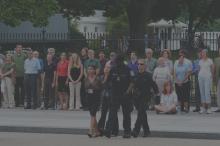
They said it was a fool’s errand.
They said there was too much money on the other side.
They said the politics were too difficult.
And yet here we are.
As my friend Bill McKibben wrote in 2011, our indigenous brothers and sisters in Canada had been fighting the Keystone XL pipeline for years. But before August 2011, virtually no one in the U.S. had even heard of it.
Then I read the pastoral letter from Alberta’s Bishop Luc Bouchard, The Integrity of Creation and the Athabasca Oil Sands, and I felt the Spirit calling me to action.
We put out a call to religious leaders to join the Tar Sands Blockade in Washington, D.C., in the summer of 2011. It was hot. It was humid. It was summer in D.C. But hundreds and hundreds of Protestant pastors, rabbis, Buddhist priests, Franciscans, Unitarians, and Christians of all stripes said they would come.

THOSE OF US who work on global warming are well-defended against even moderate optimism. Every day brings another study showing how far we’ve pushed the planet’s physical systems. For instance, new research has emerged showing that even as the planet is setting remarkable temperature records, the meltwater pouring off Greenland has cooled a patch of the North Atlantic and perhaps begun to play havoc with the Gulf Stream. Simultaneously, new research showed that the soupy hot ocean everywhere else was triggering the third planet-wide bleaching of coral in the last 15 years. It is entirely possible we’ve set in motion forces that can’t be controlled.
That said, for the first time in the quarter-century history of global warming there’s room for at least some hope in the arena we can control: the desperate political and economic fight to slow the release of yet more carbon into the atmosphere. It’s not like we’re winning—but we’re not losing the way we used to. Something new is happening.
Consider where we were six years ago, as the Copenhagen conference, much ballyhooed and long anticipated, ground to its dreary conclusion: The world had decisively decided not to decide a thing. There was no treaty, no agreement, no targets, no timetables. In fact, the only real achievement of the whole debacle was to drive home to those who cared about the climate that a new approach was needed. Twenty years of expert panels and scientific reports and top-level negotiations had reached a consensus that the planet was dangerously overheating. And it had also reached a dead end.
There was a reason for that, or so some of us decided: The fossil fuel industry simply had too much power. The fact that they were the richest industry in the planet’s history was giving them total power. They’d lost the argument but won the fight.
And because the rest of us were still arguing, not fighting, there was no real pressure. World leaders could go home from Copenhagen without fearing any fallout from their failure. Barack Obama came back to D.C. where he watched mutely as the Senate punted on climate legislation, and then mostly ignored the issue for three years, not even bothering to talk about it during his re-election campaign.
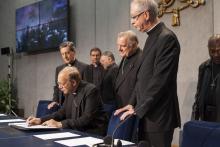
Catholic leaders made a rare appeal to the world’s politicians on Oct. 26, urging them to take strong action at the highly-anticipated U.N. climate change summit later this year.
Nine cardinals, patriarchs, and bishops representing the Catholic Church across five continents signed a document, presented at the Vatican on Oct. 26 by clergy from Belgium, Colombia, India, and Papua New Guinea.
The document presents a 10-point policy proposal calling for “a fair, legally binding, and truly transformational climate agreement.”

WASHINGTON, Sept. 29, 2015 -- Pope Francis' visit to the U.S. sparked inspiration and action among hundreds of Christian, Muslim, Jewish and other national religious leaders at the 2-day interfaith Coming Together in Faith on Climate gathering September 24 and 25 at Washington National Cathedral. The events celebrated the Pope's leadership on climate change, and top leaders pledged to make an impact in their houses of worship and inspire their congregations and communities to care for creation.

Stunning is the word that most comes to me after Pope Francis' two-day visit to Washington, D.C. The country and the media was reveling in his presence, using language like "amazing," "incredible," and "wonderful" in response to this extraordinary moral leader who literally transformed our public discourse in the 48 hours he was in the nation's capital. What these two extraordinary days mean going forward is the big question on all our hearts and minds.

Next week, the conversation will change in America. All the media attention recently given to political figures will now shift to a moral leader who is changing the global public discussion about what is compassionate, just, good, and right -- and Christian.

Pope Francis issued a call to action regarding climate change in hisencyclical on the environment. In it he wrote, “We need a conversation which includes everyone, since the environmental challenge we are undergoing, and its human roots, concern and affect us all.” America’s most influential faith and moral voices are doing just that by Coming Together in Faith on Climate at the National Cathedral in Washington, D.C. during the pope’s upcoming visit to the United States. Here’s what they have to say on the need for us to join Pope Francis’ call to protect creation...
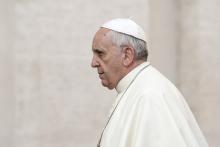
"Climate change is a problem which can no longer be left to a future generation." — Pope Francis
To mark Pope Francis' visit to the United States, Sojourners has partnered with NextGen Climate to convene key interfaith leaders and activists to welcome the Pope and his call to action on climate change.
The effort, including a full-page advertisement on Sept. 25 in the New York Times and several other newspapers, features a letter signed by 36 interfaith leaders and activists.
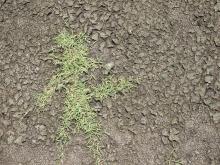
AS THE SEASON turned from summer to fall, I was reflecting again about Sojourners’ vocation, the focus of our mission and ministry.
Matthew 25:31-46 is my own conversion text, the scripture that brought me to Christ a long time ago out of the radical student movement. It’s also been a converting text for many others here at Sojourners over the years.
The 25th chapter of Matthew’s gospel has been foundational to Sojourners from the very beginning of the Sojourners community more than 40 years ago. But I am realizing that Matthew 25 is not only foundational for us, it is really our vocational text. In other words, it shapes not just what we believe and what we stand for, but also what we do as an organization—the issues we address, the campaigns we get involved in, the statements we sign, the coalitions we join, and much more.
In that sense, I’ve been thinking about Matthew 25 in relation to issues of organizational stewardship and sustainability. Autumn is always a busy season for me and for Sojourners. Faced with many invitations, requests, and opportunities to make a positive impact on a variety of issues, how do we decide where and how to focus our ministry, energy, staff, time, and gifts? How do we be good stewards of our calling? I think that Matthew 25:31-46 provides the answer. The key moment in the passage is when Jesus says:
I was hungry and you gave me food, I was thirsty and you gave me something to drink, I was a stranger and you welcomed me, I was naked and you gave me clothing, I was sick and you took care of me, I was in prison and you visited me ... Just as you did it to one of the least of these who are members of my family, you did it to me.
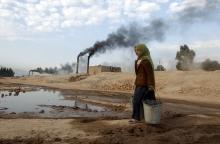
Supporters of the Islamic Declaration on Climate Change included the grand muftis (highest authorities in religious law) of Uganda and Lebanon and government representatives from Turkey and Morocco. The conference itself, the International Islamic Climate Change Symposium, was co-sponsored by Islamic Relief Worldwide, the Islamic Foundation for Ecology and Environmental Sciences, and GreenFaith.
The declaration comes at a moment ripe for climate change discussion, in the wake of President Obama’s announcement of a Clean Power Plan on Aug. 3. The plan requires states to reduce carbon emissions from coal power plants starting in 2017. It’s also a timely precursor to the upcoming United Nations Conference on Climate Change in Paris this December.
The declaration cites climate change research, followed by a detailed call to action. Among other things, it puts pressure on those attending the United Nations Conference on Climate Change to set clear goals, calls on wealthy and oil-producing nations to be leaders in curbing greenhouse gas emissions by 2050, and asks that all nations commit to 100 percent renewable energy or a zero emissions strategy.
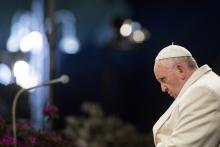
Someone has said that Pope Francis is really a Protestant. He is, if Protestant is defined as someone who protests. His recent encyclical Laudato si' is a protest against the often irresponsible industries as they pollute the environment.
Pope Francis especially protests the ways in which coal is burned in the production of electricity. He is right to protest. What comes out of the smoke stacks of coal-fed electric power plants is linked to 50,000 deaths a year, according to Physicians for Social Responsibility. Because children and the elderly among the poor are the most vulnerable, the pope, following his namesake, St. Francis, has a special concern for those that Jesus calls "the least of these."
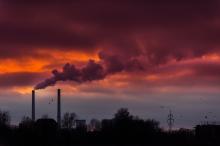
A coalition of Christian leaders issued a statement Aug. 4 calling on presidential candidates to address climate change and economic inequality, in preparation for the first presidential debate in Cleveland on Aug. 6.
More than 70 evangelical, Protestant, and Catholic leaders signed the statement, organized by the group Faith in Public Life, which advocates for the representation of faith communities in politics. Signers include Dan Misleh, executive director of the Catholic Climate Covenant; Jim Winkler, president of the National Council of Churches; and the Rev. Richard Cizik, president of the New Evangelical Partnership for the Common Good.
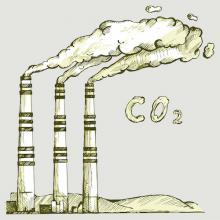
This morning President Obama and the Environmental Protection Agency released the final version of the long awaited “Clean Power Plan,” a regulation setting legally mandated state-by-state reduction targets for U.S. power plants.
Power plants are the nation’s largest source of climate pollution, releasing around 40 percent of America’s greenhouse gas emissions. Previously, there have been not been federal restrictions on how much carbon power plants can emit. White House adviser Brian Deese said the EPA rules represented the “biggest step that any single president has made to curb the carbon pollution that is fueling climate change.”
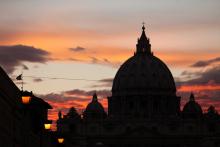
On July 21 and 22, the Vatican hosts two conferences on human trafficking and climate change, bringing the mayors of major cities — including several in the U.S. — to Rome for the events. What do human trafficking and climate change have to do with each other? And what does Catholicism have to do with them? Let us explain.
Q: Why is the Vatican concerned with human trafficking and climate change?
A: If Pope Francis has two pet issues, they are human trafficking and climate change. Since the first year of his papacy he has spoken against human trafficking, calling it “a crime against humanity” and lamenting it as modern slavery. It’s an even bet that when the pope addresses the United Nations in late September he will hammer it as one of the crucial issues of our time. Ditto on climate change. In June, the pontiff published his encyclical — the highest teaching of the church — on climate change.
“Our home is being ruined and that hurts everyone, especially the poorest among us,” Francis said just before the publication of the encyclical.
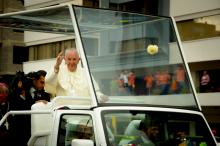
Pope Francis correctly points out that while “we are not yet tearing one another apart … we are tearing apart our common home," and that not defending our common home “is a grave sin."
The scientific community, Pope Francis believes, “realizes what the poor have long told us: Harm, perhaps irreversible harm, is being done to the ecosystem," Through human-made decisions that resulted in pollution and exploitation, Pope Francis declared, "The earth, entire peoples and individual persons are being brutally punished."